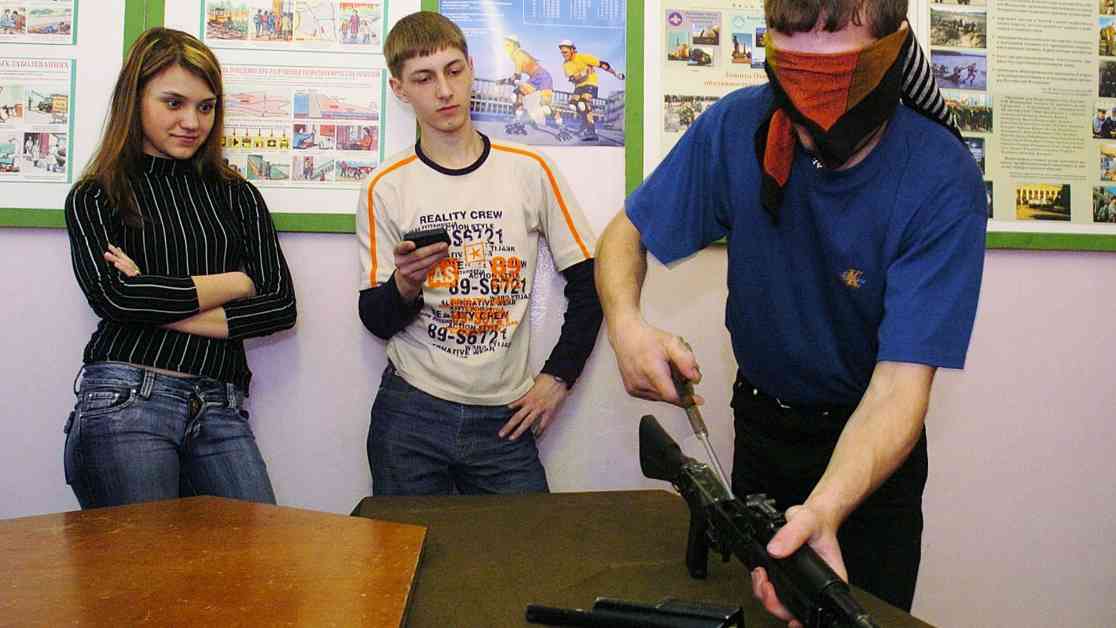In a recent development, experts have uncovered Russia’s alarming plan to build an army of what they call “child zombies.” The goal is to indoctrinate young minds from an early age, fostering loyalty to the Kremlin while sowing seeds of distrust towards Western nations. Since the invasion of Ukraine in 2022, Russia has intensified efforts to control its youth, implementing a series of propaganda tactics dubbed the “Three Pillars” by experts. These strategies include compulsory patriotic education, rewriting history to align with Kremlin narratives, and engaging children in military-patriotic activities.
Experts Warn of Putin’s Coercive Tactics
According to Russia expert Mikhail Komin, the Putin regime is strategically targeting children from kindergartens to universities, aiming to cultivate a generation of loyalists who will support Putin’s authoritarian rule. The recent invasion of Ukraine has heightened Putin’s need for popular support, leading to a more aggressive approach in shaping young minds. Dr. Maxim Alyukov, a research fellow at King’s College, echoes these concerns, highlighting how early indoctrination aims to solidify pro-regime sentiments and suppress dissent among the youth. The regime’s focus on children is seen as a preemptive measure to curb future opposition to Putin’s leadership.The Kremlin’s Propaganda Machine
Compulsory patriotic education in Russian schools has emerged as a key tool in the Kremlin’s propaganda arsenal. Through classes like “Conversations About Important Things,” students are exposed to a distorted version of Russian history that glorifies the regime and demonizes the West. Recent changes in history textbooks reflect a pro-Kremlin bias, downplaying Soviet atrocities and justifying Putin’s aggressive policies. The invasion of Ukraine is reframed as a “special military operation,” portraying Western powers as the instigators of global conflicts. Experts warn that these deliberate distortions are designed to manipulate young minds and justify Russia’s belligerent actions.
Compulsory patriotic education in Russian schools has emerged as a key tool in the Kremlin’s propaganda arsenal. Through classes like “Conversations About Important Things,” students are exposed to a distorted version of Russian history that glorifies the regime and demonizes the West. Recent changes in history textbooks reflect a pro-Kremlin bias, downplaying Soviet atrocities and justifying Putin’s aggressive policies. The invasion of Ukraine is reframed as a “special military operation,” portraying Western powers as the instigators of global conflicts. Experts warn that these deliberate distortions are designed to manipulate young minds and justify Russia’s belligerent actions.
Active military-patriotic organizations like Yunarmiya and Dvizheniye Pervykh are further engaging children in militaristic activities, teaching them skills like grenade throwing and rifle assembly. The regime’s digital media strategy aims to reach young audiences through popular culture and online influencers who promote state-approved narratives. By controlling access to independent media and educational resources, the Kremlin seeks to limit dissenting voices and shape public opinion in its favor. The suppression of critical voices and the enforcement of pro-regime propaganda underscore Putin’s authoritarian grip on Russian society.
In neighboring Belarus, a similar pattern of coercion and indoctrination is unfolding. Thousands of Ukrainian children have been abducted and transported to Belarus, where they are subjected to intense Russification and militarization. These children are forcibly enrolled in “rehabilitation” camps, where they are brainwashed, taught to speak Russian, and indoctrinated into patriotic military movements. The ultimate goal is to erase their Ukrainian identity and groom them as future soldiers for the Belarusian army, further entrenching the Kremlin’s influence in the region. The international community has condemned these actions as part of Russia’s hybrid invasion strategy, aimed at destabilizing Ukraine and undermining its sovereignty.
As the Putin regime tightens its grip on Russian youth and extends its influence abroad, the need for vigilance and resistance against authoritarian propaganda grows. By exposing the insidious tactics used to manipulate young minds, experts hope to raise awareness and foster critical thinking among future generations. The battle for truth and freedom of thought is ongoing, and the stakes have never been higher.





















